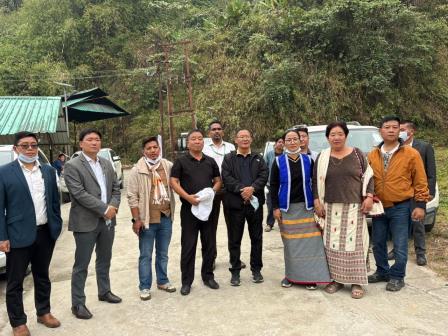-
COPU reviews state PSUs in second sitting
-
CM stresses on strong internal security, tech-driven policing
-
Cabinet approves proposals aimed at strengthening governance, enhancing public…
-
Body found hanging at bus stop with limbs tied sparks…
-
Mein chairs pre-budget consultative meeting with community based organisations
-
District level training on Census of India 2027 begins at…
-
WCD Minister reiterates commitment to safeguarding rights, dignity of…
-
Woman loses life in massive fire, two children seriously injured
-
 UA Minister inspects burial ground, focuses on maintenance and improvement
UA Minister inspects burial ground, focuses on maintenance and improvement
-
 UA Minister inspects burial ground, focuses on maintenance and improvement
UA Minister inspects burial ground, focuses on maintenance and improvement
For a state which is trying hard to efface its shortcomings, a single success in any field always acts as a tonic. The news about significant reduction of malaria cases in Papum Pare district is that kind of an inspirational example. By achieving this feat, it can now be said that the district has not only contributed to the overall public health efficiency index of the state but also reduced the burden on the state’s exchequer as there will be no need for indoor residual spray by health department from this year onwards. There can’t be a better day for this invigorating news to be declared, since it was on April 25, the World Malaria Day.
There are major diseases all across world, still posing threats to mankind and each has its own day to convey its respective concerns. World Malaria Day aims to recognize and celebrate the worldwide efforts to control and raise awareness about the disease, which to any Indian is nothing short of a terror since the sting of mosquito is no less lethal than the wound of a bullet. History of this epidemic dates well beyond British colonial era to centuries, when with varying intensities it wiped out villages after villages throughout length and breadth of the country causing enormous economic costs and indescribable human misery. In 1947, when the nation started its journey with a population of 330 million, about 75 million people got infected with malaria every year with high mortality rates. The fight has been going on since then under the banner of various flagship programmes and with varied rates of success. But for the country, year 2017 was something to be proud of since it accounted for only 4 percent of worldwide malaria cases and managed 3 million fewer when compared to 2016. And the long awaited shot in the arm was received on the day just before the World Malaria Day this week, when the country’s apex central body for bio-medical research, Indian Council of Medical Research launched a programme to bring various stakeholders on a single platform to identify and prioritise research work needed to reach the target of ‘Malaria Free India’ by 2030.
But the fear of this vector borne disease still remains, particularly because climate change has increased its risk substantially. And since there is no malaria vaccination yet, it’s only a battle half won. Any complacency in the wide number of outreach programmes currently at play in educating the masses about the precautionary & allied measures will only prove disastrous.
Papum Pare has done a commendable job in its battle against malaria. It’s a ‘surgical strike’ of a different kind worth emulating by others.

Kenter Joya Riba
(Managing Editor)She is a graduate in Science with post graduation in Sociology from University of Pune. She has been in the media industry for nearly a decade. Before turning to print business, she has been associated with radio and television.
Email: kenterjoyaz@easternsentinel.in / editoreasternsentinel@gmail.com
Phone: 0360-2212313

